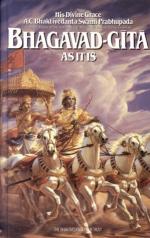
|
| Name: _________________________ | Period: ___________________ |
This test consists of 15 multiple choice questions and 5 short answer questions.
Multiple Choice Questions
1. What does Krishna say happened to the practice of yoga through time?
(a) The practice of yoga became enhanced.
(b) The practice of yoga was lost.
(c) The practice of yoga was discovered.
(d) The practice of yoga became corrupted.
2. How does Krishna urge Arjuna to reshape himself?
(a) Through the power of his will.
(b) Through the power of his mind.
(c) Through the power of his heart.
(d) Through the power of his muscles.
3. What has the person done, who indulges his senses for his own pleasure, ignoring the needs of others, according to Krishna?
(a) Discovered the meaning of life.
(b) Harmed no one.
(c) Wasted his life.
(d) Worshipped God.
4. What does Krishna say is his true nature?
(a) Transcendant of birth and death.
(b) Lightness of heart.
(c) The peace of death.
(d) The joy of birth.
5. What does Krishna say is the fate of those who have no faith in the supreme law of life?
(a) They are sent to hell.
(b) They never die.
(c) They pass from death to death.
(d) They pass into nirvana.
6. What souls live in the body as its master?
(a) Those who renounce attachment in all their deeds.
(b) Those who enjoy material existence.
(c) Those who honor their father and mother.
(d) Those who live for bodily pleasure.
7. According to Krishna, what do those who excel control?
(a) Children.
(b) Wives.
(c) Time.
(d) Senses.
8. According to Krishna, who thinks always, "I am not the doer?"
(a) Those with hightened consciousness.
(b) Those without consciousness.
(c) Those whose consciousness is divided.
(d) Those whose consciousness is unified.
9. What does Krishna say the Lord of this world does not partake in?
(a) The evil deeds of any person.
(b) Sensual pleasures.
(c) The good and evil deeds of any person.
(d) The good deeds of any person.
10. Who is with Arjuna before the battle begins?
(a) Sanjaya.
(b) The Prime Minister of India.
(c) Sri Krishna.
(d) Dhritarashtra.
11. According to Krishna where does reality lie?
(a) In human trials and tribulations.
(b) In the temporal.
(c) In scripture.
(d) In the eternal.
12. What do the six months of the northern path of the sun lead souls to?
(a) These months lead souls to rebirth.
(b) These months lead souls to liberation.
(c) These months lead souls to sadness.
(d) These months lead souls to pleasure.
13. What does Krishna say is the only friend of the Self?
(a) The will.
(b) God.
(c) The mind.
(d) The heart.
14. What is the path for those who have ascended to yoga?
(a) Selfless work.
(b) Stillness and peace.
(c) Carefree living.
(d) Turbulence and unrest.
15. Where do Dhritarashtra's family and the Pandavas gather to fight?
(a) The field of dreams.
(b) The field of dharma.
(c) The great mountain.
(d) The field of Rohan.
Short Answer Questions
1. Who does Krishna say is the father, mother and grandfather of the universe?
2. According to Krishna, what is worse than death for a man of honor?
3. What does Krishna do when someone is devoted to something with complete faith?
4. What does Krishna say it is difficult to achieve perfect renunciation without?
5. What creatures are most dear to Krishna?
|
This section contains 594 words (approx. 2 pages at 300 words per page) |

|




